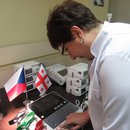The 21st century is often referred to as the digital age. In today's world, businesses provide many services and products to customers online, and at the same time, customer demand for such services is increasing. In the wake of technology development and constantly updated trends, especially in the post-COVID-19 period, digital professions are becoming increasingly relevant.
We talked to Zurab Pertaia, trainer of the EU-funded project "Upskilling Digital Competencies and Career Management Skills of Disadvantaged Youth" about mastering digital professions, the advantages and challenges of remote work, and where to look for remote work opportunities.
What is the digital job market like, and why is it important to master digital professions?
Digitisation makes it possible for everyone, from individuals and SMES to large businesses, to sell their products or services through remote channels. In the last year and a half, technologies developed in the direction of artificial intelligence (AI) have been enjoying great popularity, which digitised various services even faster. Today, we must apply our skills and knowledge to use digital tools, services, and technologies. Such job opportunities will significantly help people with mobility limitations.
Working remotely is especially important for people experiencing certain difficulties regarding mobility. If earlier people had to leave the house to work, today, this is no longer necessary in many cases. Today, the provision of services that can be done remotely with a computer and the Internet, including even the management of an organization, no longer requires the physical movement of people. In our era, people often live on different continents, but together, they create the best products and services.
What opportunities does the Georgian employment market offer people interested in remote work?
Before the pandemic, remote jobs of this type occupied a minimal share of the Georgian employment market. However, during and after the pandemic, many businesses have seen that it is possible, and in many cases, more efficient, to work remotely. This has led to an increase in the demand for remote work and, accordingly, in the supply. Today, people work from different regions, even villages – the main thing is to have a computer and the Internet to do such work.
This has resulted in huge businesses adapting to the new situation. We've seen thousands of employees switch to remote work. This led to the fact that even SMEs today employ staff remotely freely and with high acceptance several years after the pandemic. Working remotely is also beneficial for the business, as it saves a lot of costs.
It is often said that remote work has its disadvantages. What do you think about it?
The more information there is, the greater the risk is of this information being stolen, which in turn requires more protection and proper management of digital resources. This applies especially to information about users. Obviously, this is about challenges from a business perspective.
As for remote work, I would highlight part of the corporate culture here – t is difficult for new employees to share the corporate culture remotely, and it can even be a particular barrier, which is rarely found in the physical work environment. However, some companies have fears that if I can't see my employee (when they are in the office, I can see where they are, I can see their computer), I might not be able to control them remotely.
As you know, our project beneficiaries are people with special requirements and unemployed young people who cannot receive education and are not involved in any training or educational program. For such young people, please share your advice on how to master the digital profession and get a job is essential.
The first thing I recommend to any young person is that if they are not studying, they should definitely start learning and become digital citizens. Young people need to begin mastering the digital tools they need to be employable today. It should be taken into account that the knowledge obtained once is not enough because trends change very quickly, and we must constantly follow the news. This is where the direction of quick adaptation comes in, which means always being in shape.
Today, many digital resources are available for free and online to help people learn digital skills. On YouTube, there is a plethora of materials in which there is even a chance to dive. Free resources are Google, Coursera, Udemy, and edX. Remember the importance of practice – starting the first job soon after acquiring knowledge is very important. Learning comes from practice and doing.
Where should they look for work? First of all, on the Internet – on various sites and platforms. It should be noted that today, the demand in the digital direction from the business side is very high, while the supply needs to be more.
The interesting and good thing is that learning, imparting, and working on digital skills is not limited to a country. If we know foreign languages, for example, English, we can easily take our service to the employment market of another country. In Georgia, there is also a need for staff in entry-level positions, where people with newly acquired knowledge can start working relatively easily. After the pandemic, the recruitment market has changed; among them, many foreign companies are looking for employees for remote work.
The EU-funded project "Enhancing Digital and Career Management Competencies for Vulnerable Youth in Georgia, Armenia, and Moldova" is implemented by Caritas Czech Republic in Georgia. The project partners are the Moldovan organisation Millennium and the Armenian organisation Agate.
This article was created with the assistance of the European Union. Its contents are the sole responsibility of Caritas Czech Republic and do not necessarily reflect the views of the European Union.









